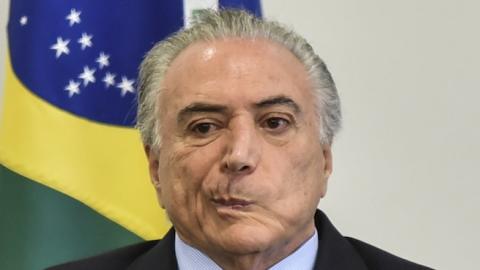Here we go again: A handful of opposition politicians in Brazil are filing for the impeachment of the country's President. Michael Temer, who replaced Dilma Rousseff after she was impeached earlier this year, has been battling allegations of corruption since taking office. The Financial Times reports:
Since Mr Temer took power, he has lost an average of a minister a month. Last week, two ministers resigned, amid allegations that the president had used his influence to help an ally with a property deal.
“Now we are facing a crime of responsibility without any room for doubt,” said Ivan Valente, the leader in congress of the leftist Socialism and Liberty party, which is set to call for his impeachment. Mr Temer denies any wrongdoing.
The impeachment request from a minor opposition party is unlikely to gain traction for now, analysts say. But the controversies come at a time when Mr Temer’s government is being tested on whether it can deliver on promises to rescue Brazil’s economy.
The “Car Wash” scandal that brought down the Rousseff government continues to claim new victims—including ministers in the new President’s government. The political infighting is intensifying as politicians scramble for power and maneuver to avoid jail and disgrace. Meanwhile, the economy is not pulling out of recession as quickly or as solidly as hoped.
Part of what is driving the upheaval in Brazil is the collision of a rising middle class with an oligarchical elite. Better educated and more highly skilled than their parents and grandparents, young Brazilians today are unwilling to put up with the corrupt political structures inherited from the past. But Brazil hasn't yet developed the new kinds of political parties and new institutions of government it needs; the country is like a teenager in a growth spurt trying to squeeze into last year’s clothes.
A bout of solid economic growth would give Brazil’s political system some room to breathe, but the global economy doesn't appear to be cooperating. Rising interest rates and a stronger U.S. dollar threaten to entice investors out of emerging markets like Brazil. And with China still facing stagnation and economic transition, commodity exporters like Brazil face limited demand for what they produce.
It is easy to be too pessimistic about Brazil. Brazilians have come through worse crises than the ones they face now. Still, trouble in Latin America’s largest economy and most populous country is not something the world needs right now. Dramatic and stormy as the past year has been, we could be facing an even more tumultuous 2017.


















